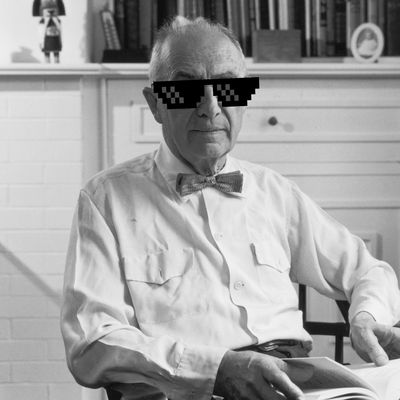
This Is Just to Say
I have written
this story
on the internet
about a poetry meme
and here
you were probably
planning
to make this joke yourself at some point
Forgive me
it is delicious
so sweet
and so dumb
No really, do forgive me. If you are present on the internet — scrapbooking on Tumblr or, especially, tweeting on Twitter — you have probably seen this joke a lot lately, existing as it does in that snowballing space between “everyone making the same joke” and “full-on meme.”
Maybe you saw this tweet:
Or maybe this one:
Or maybe one of the hundreds of others engaging in the same wordplay, reveling in the same silly high-low. For those of us who have not spent much time with a Norton Anthology of late, the “high” part of that high-low comes from the pedigree of the source material. The poem is, of course, “This Is Just to Say” by the canonical modernist William Carlos Williams. The “low” part comes from, well, read for yourself.
These are just a handful of the newest versions of a joke nearly as old as the poem itself. “This has for years, maybe decades, been the most parodied poem in America,” said Stephen Burt of Harvard. Indeed, Williams himself put out a twist on it, a “found poem” by his wife, Flossie. And Kenneth Koch wrote his “Variations on a Theme by William Carlos Williams” in the 1960s, a series that culminates in this: “Last evening we went dancing and I broke your leg. / Forgive me. I was clumsy, and / I wanted you here in the wards, where I am the doctor!” In the decades since then, thousands of versions have sprouted up — including some uncountable number on Twitter, which started allowing line breaks, and thus really let the joke take hold, in the spring of 2013.
It makes some sense. The poem is short, clocking in at just 149 characters in total, easily cut to under 140. It is iconic, quickly recognized if faintly remembered by anyone who took a high school English class. Its language is simple and striking. “It’s just an elegantly constructed piece of English syntax,” Burt said. “It’s very close to a lot of things we actually say in daily life, but off. It’s easy to make it funny. It’s easy to make it serious. There’s lots of breadth to it.” Moreover, he pointed out, unlike many other memorable poems, there is no meter and no rhyme, making it a touch easier to parody than, say, Wordsworth. “One of the things that Williams really wanted to do was to make poetic language that was just as memorable without meter and rhyme, as with meter and rhyme,” Burt said. “He thought of meter and rhyme as English, and he wanted to make his poetry American.”
Even without some of those formal constraints, though, “This Is Just to Say” is easily recognized as poetry, haikulike in its deliberate and sparse construction. “Williams’s poems are all about line breaks, and they’re heavily enjambed,” said Harris Feinsod of Northwestern University. “Williams was really meticulous about typography. The critic Marjorie Perloff called it his ‘visual prosody.’”
It all adds up to a poem inadvertently perfect for replication on social media. And then comes the fact that it is a weirdo confession about compulsive overeating — that is, catnip for the #millennials on the #netz. “The original poem plays on that ironic difference between something formally arranged as a piece of verbal art and its status as a quick, impetuous note to confess this domestic sin,” Feinsod said. And thus it has taken hold.
That’s much to the amusement of scholars of modernist poetry, and probably would be much to the amusement of Williams himself. “Williams did not become famous for writing poetry until he was almost too old to enjoy it,” Burt said. “I think he would have liked the attention.”
Feinsod went a little further. “There’s a populist nature to the idea that anyone can write a Williams parody,” he said. “He really wanted to take poetry out of the hands of the Pounds and Eliots, with their classical references. He had this sense of poetry arising all around us. I think the proliferative nature of it might have appealed to him. And if he produced the first parody of the poem, it wouldn’t surprise me if he weren’t happy to see other people doing it.”
There you have it. William Carlos Williams: brilliant modernist, producer of snackable content, Twitter visionary before his time. Gah. Forgive me.





























